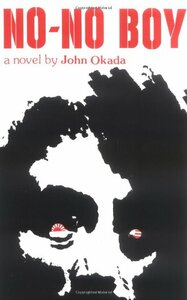Take a photo of a barcode or cover
Amazing. The book carries dissatisfaction and yearning akin to Kerouac, but with a perspective that connects to a broader audience. An essential book that ought to be more prominent in the American Lit cannon..
Wasn't a fan of the writing style (I read it as an audiobook and for some reason found it hard to focus on, not sure if it's on the style or on my ability to focus at that moment but probably a bit of both) but this is definitely something I'd be happy to revisit with my high school students at some point, it's a great classic and there's a lot there that'd be interesting to analyse.
This is another case where the social significance of the work and experiences it portrays are perhaps more significant than it's merit as a work of fiction alone. It's a so-so read which I warmed up to over time, but nothing to get excited about.
thoroughly enjoyed. fictionalized account of Japanese young man who refused to draft from internment camp.
Such a poignant and powerful articulation of grief, loss, generational trauma, identity, and the psyche of war- rendered all the more powerful as I read it alongside the Sympathizer. Very well done.
An incredibly moving and important account of the Japanese-American experience in post-war America. Early on, Okada's writing is almost too didactic to be properly enjoyed, and every meaningful event seems over-explained in Ichiro's inner monologue, but by the time Kenji enters the story, it really picks up and becomes more natural. The large cast of characters is what really does the story justice. Ichiro interacts with so many people of so many moral stripes - good, bad, despicable, understanding, pitiable, cruel, kind - and it is these varied interactions that truly "sell" Okada's central thesis of moral ambiguity and fractured identity, much more so that Ichiro's over-obvious internal monologue. An extremely important book by an equally important author that deserves more play in high schools and colleges as a text to begin the dialogue on racial politics and American identity.
Fast paced novel that deals with the emotional fallout Ichiro experiences after his family’s internment and his imprisonment for avoiding the draft. Okada was definitely ahead of his time and had poignant ideas about the nature of race and what it means to be an American. Many characters and storylines to follow but they all shed light on a distinct struggle. You leave with a glimmer of hope for the future as does Ichiro.
dark
emotional
reflective
No-No Boy was hard to find, but amazingly, I encountered a hard copy at BookOff in San Diego a few years back. The cover – not to judge the book by it – put me off as a bit unnerving, and the subject matter was a little off-putting as well. That is, the book is about a man who answered "no" to the two questions posed by the U.S. government of Japanese-American men at the time of WWII: do you renounce Japan, and will you fight for America?
This book was written by a Japanese-American man who did in fact fight for America in WWII, so I find his portrayal of Ichiro, the protagonist, surprisingly realistic and thoughtful. In general, this book is for people who know something of the history of Japanese-Americans during that period, and some references may be lost on other readers.
I found it hard to get through the first half of the book, for all the run-on paragraphs and sentences which, stylistically, were not my preference. However, after a while, Okada begins to address real and heavy topics like loyalty, guilt, and discrimination. Despite the fact that my grandfather served in the 100th Battalion 442nd Infantry Battalion of the U.S. Army, and didn't experience the same backlash for being Japanese as Ichiro does in the book, the discrimination that is portrayed is highly realistic and accurate from what I understand.
My grandfather said that, even as a highly decorated, returned veteran, he experienced racism and discrimination, so it wasn't just the no-no boys. In any case, Okada paints a bleak picture of a man struggling to find his identity and place in a country that hates him blindly. This book was thought-provoking and moving for me, as a yonsei (fourth-generation) Japanese-American, and I recommend it.
This book was written by a Japanese-American man who did in fact fight for America in WWII, so I find his portrayal of Ichiro, the protagonist, surprisingly realistic and thoughtful. In general, this book is for people who know something of the history of Japanese-Americans during that period, and some references may be lost on other readers.
I found it hard to get through the first half of the book, for all the run-on paragraphs and sentences which, stylistically, were not my preference. However, after a while, Okada begins to address real and heavy topics like loyalty, guilt, and discrimination. Despite the fact that my grandfather served in the 100th Battalion 442nd Infantry Battalion of the U.S. Army, and didn't experience the same backlash for being Japanese as Ichiro does in the book, the discrimination that is portrayed is highly realistic and accurate from what I understand.
My grandfather said that, even as a highly decorated, returned veteran, he experienced racism and discrimination, so it wasn't just the no-no boys. In any case, Okada paints a bleak picture of a man struggling to find his identity and place in a country that hates him blindly. This book was thought-provoking and moving for me, as a yonsei (fourth-generation) Japanese-American, and I recommend it.





